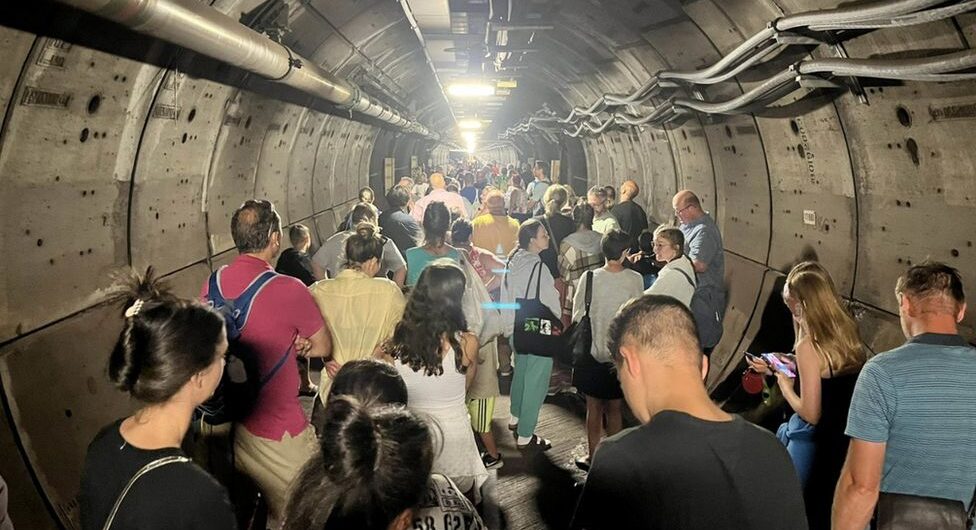Dozens of people were left stranded for hours inside the Channel Tunnel after a train from Calais to Folkestone appeared to have broken down, according to the BBC.
Footage emerged showing Eurotunnel Le Shuttle passengers being evacuated through an emergency service tunnel after having to abandon their vehicles.
They were eventually transferred to a replacement train and taken to the Folkestone terminal in Kent.
A Eurotunnel spokesman said services were now back to normal.
Le Shuttle said Tuesday night’s incident began when the train’s alarms went off and this needed to be investigated.
A spokesman said such incidents were unusual but not exceptional – far more common on trains carrying lorries than those with private cars.
“The Shuttle was brought to a controlled stop and inspected. As a precautionary measure, for their safety and comfort, we transferred the passengers on-board to another shuttle, via the service tunnel [which is there for exactly that purpose],” the spokesman said.
“We brought them to the passenger terminal building, where food and drinks were available, and then slowly brought out the original shuttle and reunited them with their vehicles.”
Sarah Fellows, 37, from Birmingham, told the PA news agency she found the service tunnel “terrifying”.
She added: “It was like a disaster movie. You were just walking into the abyss not knowing what was happening. We all had to stay under the sea in this big queue.
“There was a woman crying in the tunnel, another woman having a panic attack who was travelling alone.”
Another passenger, who did not want to be named, said: “Several people were freaking out about being down in the service tunnel, it’s a bit of a weird place… We were stuck down there for at least five hours.”
Mike Harrison, from Cranbrook in Kent, told BBC News it took about six hours to travel from Calais to Folkestone.
He said staff spent over an hour trying to find the fault on the train after it had broken down initially before they got it moving again only for it to “conk out” after five minutes.
Passengers had to walk 10 to 15 minutes to another train, he said.
“Things were getting a bit fractious, a bit stressed. A few people were having minor panic attacks,” he said.
But the freight train used to take passengers to the terminal was also hit by problems with Mr Harrison saying it did not have enough traction.
“By the third time we were all just thinking ‘what is going on’,” he said.
Rachel Thynne told BBC Radio Kent it was “getting hotter and hotter” while staff tried to identify the problem.
All those on board the train were transferred “in line with safety procedures and as a comfort measure”, Le Shuttle said.
A passenger contacted the BBC before 17:45 BST saying they were on the train which had stopped.
They complained of poor communication and said the public address system did not work properly.
Four additional trains were laid on overnight from Calais to Folkestone to deal with the backlog from the incident.
The service transports passengers and their vehicles between Folkestone and Calais.
At 23.5 miles (37.9km), it has the longest underwater section of any tunnel in the world.
Le Shuttle said all passengers would be contacted individually to arrange compensation.




